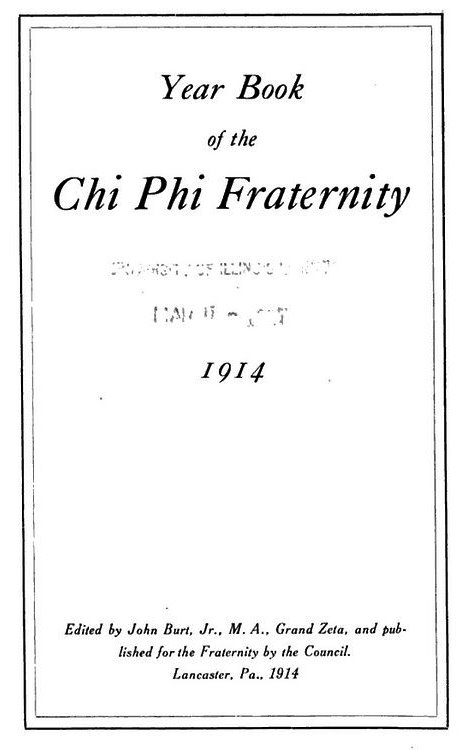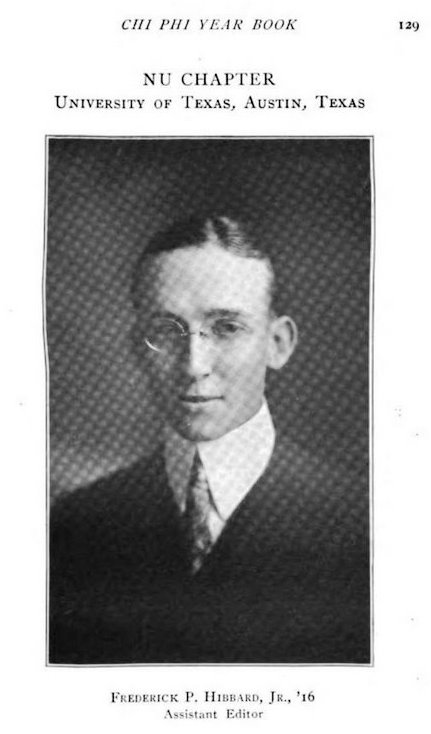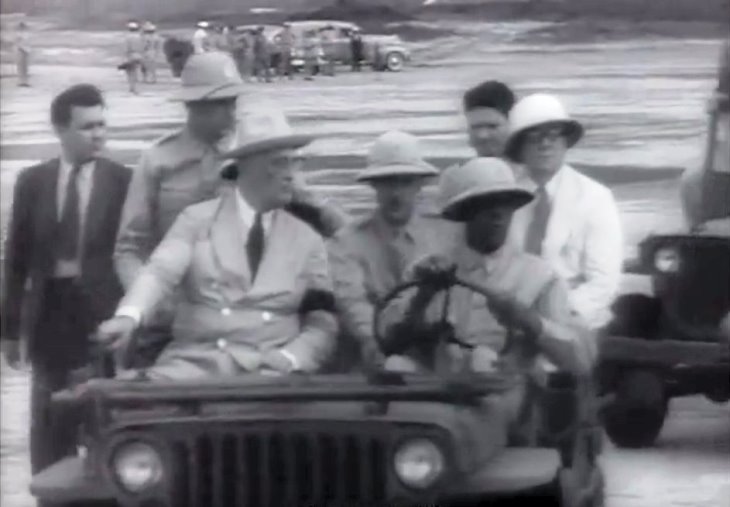|
Frederick P. Hibbard Jr.
University of Texas Frederick P.
Hibbard was
born in Denison in the 1890s, but he left
town for good at an early age.
He spent his entire career in the service of his
country, and his job took him
to many foreign lands. He was written about in Time
magazine, and his voice was
heard on radio around the world. Yes, I could be
speaking of Dwight Eisenhower.
But those first three sentences also describe
Frederick Pomeroy Hibbard, Jr. Born in Denison on July 25, 1894 to Frederick Pomeroy and Daisy Bacon Hibbard, Frederick P. Hibbard Jr. attended Culver Military Academy in Indiana, took his A. B. from the University of Texas, graduating in 1917, and did a year of postgraduate work at Harvard. While attending UT, Fred served as Assistant Editor of his fraternity's yearbook and as a Senior was elected editory of UT's monthly student publication, "The Magazine." The fraternity of his choice has the mission of "To build better men through lifelong friendships, leadership opportunities, and character development." (Source : Chi Phi Fraternity) He served in
the army from 1917 to 1919 before entering the
U. S.
Foreign Service in 1920. His appointments
included posts in Warsaw (1921), London (1924),
Mexico City (1926), La Paz, Prague, Bucharest,
and Monrovia. Frederick
was still in the Foreign Service when he died of
an unknown illness in
1943. He was 49. His father died in 1903 at age
39 (when Fred Jr. was 9 years
old). Fred Sr. is buried in Fairview Cemetery in
Denison. You may
know something about the Hibbards, who were in
the drug and grocery business in
early Denison. You may even be familiar 
The
second item is an 1805 book once owned by
Hibbard. It is now available for
$3,000, with his name still on the bookplate.
You can read about it and see a
picture of it at The
last item is an audio clip that includes Hibbard
speaking. It's from the Czech
Radio archives, and the occasion was the 200th
anniversary in 1932 of the birth
of George Washington. The complete recording is
just over five minutes long.
The first four minutes are http://www.radio.cz/en/article/97059
In the only foreign
capital named after a U. S. President—Monrovia
of Liberia— Frederick Pomeroy Hibbard, a white
Texan who for 15 For several reasons a
bad diplomatic situation in Liberia is
usually much worse than a bad situation
anywhere else: 1) Political respect for
12,000,000 U. S. Negroes requires that the
post of U. S. Minister to Liberia
shall be held by a Negro, and having a Negro
Minister, though stoutly
backstopped by a white legation Secretary,
does not simplify the art of
diplomacy. 2) When the Secretary of State
wants to send an emissary to Liberia,
he is lucky if there is a ship sailing for the
African West Coast within a
month, luckier still if the emissary reaches
Monrovia in less than another
month. 3) When the emissary lands in a surf
boat at Liberia's harborless
capital, he finds a dirty, ramshackle tropical
town whose inhabitants consist
of about 100 whites, 10,000 blacks, and
1,000,000 rats, where a one-year tour
of duty is considered the equivalent of three
years at Warsaw or Moscow. 4) The
emissary's job is to deal with a Government
controlled by perhaps 20,000 purse-
proud Afro-Americans (who comprise most of the
"landholders of Negro
blood," the only qualified voters according to
the Liberian Constitution)
who for the last century have never succeeded
in controlling the million or
more Afro-Africans who inhabit Liberia's
43,000 square miles of equatorial
jungle. 5) If everything does not go well in
Liberia, it is just too bad for
the U. S. State Department which is held
responsible by the world at large. For
Liberia was founded over a century ago as a
colony for freed Negro slaves from
the U. S., has a Government with a President,
a Senate, a House of
Representatives and all other U. S. fixings.
U. S. honor cannot afford to let
the British from Sierra Leone or the French
from the Ivory Coast step in and
clean up. During the last five
years conditions in Liberia have been salt in
the wounds of the State Department. The
British objected that the rats in Monrovia
were so bad that bubonic plague was prevented
from spreading through West
Africa only by the fact that it had no harbor
in which ships could dock; that a
smallpox epidemic ravaged the interior; that
the simplest health measures were
unknown and Liberia More serious was the
charge that Liberian President Charles Dunbar
Burgess King, along with his Vice President
and several Cabinet members, had
been profiting by having their "Frontier
Guard'' raid villages of their
Afro-African countrymen, torture women and
chiefs, seize black bucks and sell
them into slavery in French Gabun and Spanish
Fernando Po. When a League of
Nations Commission verified the practice.
President King and his followers, on
stern advice from Washington, resigned. Next
Liberia, under President Edwin
Barclay, defaulted on its loan of $2,250,000
from Harvey Firestone. In 1925
when rubber was $1 per Ib. the State
Department had encouraged Mr. Firestone to
start a huge rubber plantation in Liberia and
lend the African Republic money
to pay off its European and other debts. Mr.
Firestone planted 55,000 acres of
rubber trees, built 100 miles of road (five
times as much as Liberia had ever
had before), hired thousands of natives at 25¢
a week, gave Liberia a brief
boom. Then with Depression the Liberian
Congress seized the revenues set aside
to service the Firestone debt. The U. S.
protested that this was contrary to
the Liberian Constitution. Proclamations were
posted that any Liberian Supreme
Court Justice who held the Act
unconstitutional would be assassinated. Since the U. S. could
not stop these occurrences, the League of
Nations tried. Liberia is a charter member of
the League, for it had joined the
Allies one day during the War when a British
warship anchored off Monrovia. The
League found that Liberia, besides having no
health service, had no budget, no
accounts, no money, that its trouble was, as
Lord Cecil put it, "the
incompetence of the Government and
corruption—but rather more incompetence than
corruption." The League offered to send
Liberia a Government adviser to
set things right. President Barclay proudly
declined. The League threatened to
expel Liberia, then looked up its own
constitution, found it had no authority
to do so. Last September U. S.
Diplomat Hibbard took one of the least
pleasant assignments in a career which had
taken him from Poland to Peru. Only
difficulty he was spared was the presence of a
U. S. Minister at Monrovia.
Charles E. Mitchell, the last to hold that
post, had been retired because of
the prolonged lack of recognition of Liberia.
As Charge d'Affaires. Mr. Hibbard
had spent long days in polite palaver President Barclay,
sitting in his wicker rocking chair on the
second-story veranda of the Executive Mansion
where he daily looks down on the
tall grass and tin cans in the square below,
graciously accepted the offer. Mr.
Hibbard privately thanked God that his job was
done, hoped he would be
relieved. In the U. S. hundreds of Negroes
began to besiege Postmaster General
Farley's lieutenants with requests to be
appointed U. S. Minister Resident
& Consul General to Liberia —at $10,000
per year. The State Department was
so happily excited over this settlement of
"the Liberian crisis"
that, in the mimeographed announcement of its
accomplishment, it carelessly
called the President of a friendly nation
Edward instead of Edwin. http://www.time.com/time/magazine/article/0,9171,754906-3,00.html#ixzz0m4yKbHeh 
 January 17, 2016  Biography Index Susan Hawkins ©2025 If you find any of Grayson County TXGenWeb links inoperable, please send me a message. |


